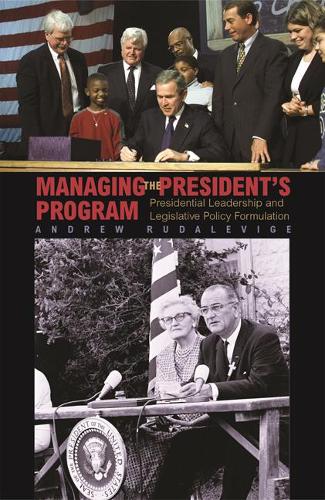
Managing the President's Program: Presidential Leadership and Legislative Policy Formulation
(Paperback)
Publishing Details
Managing the President's Program: Presidential Leadership and Legislative Policy Formulation
By (Author) Andrew Rudalevige
Princeton University Press
Princeton University Press
1st October 2002
United States
Classifications
Professional and Scholarly
Non Fiction
Central / national / federal government policies
320.60973
Winner of American Sociological Association Presidency Research Section Richard E. Neustadt Book Award 2003
Physical Properties
Paperback
296
Width 152mm, Height 235mm
425g
Description
The belief that U.S. presidents' legislative policy formation has centralized over time, shifting inexorably out of the executive departments and into the White House, is shared by many who have studied the American presidency. Andrew Rudalevige argues that such a linear trend is neither at all certain nor necessary for policy promotion. In Managing the President's Program, he presents a far more complex and interesting picture of the use of presidential staff. Drawing on transaction cost theory, Rudalevige constructs a framework of "contingent centralization" to predict when presidents will use White House and/or departmental staff resources for policy formulation. He backs his assertions through an unprecedented quantitative analysis of a new data set of policy proposals covering almost fifty years of the postwar era from Truman to Clinton. Rudalevige finds that presidents are not bound by a relentless compulsion to centralize but follow a more subtle strategy of staff allocation that makes efficient use of limited bargaining resources. New items and, for example, those spanning agency jurisdictions, are most likely to be centralized; complex items follow a mixed process.The availability of expertise outside the White House diminishes centralization. However, while centralization is a management strategy appropriate for engaging the wider executive branch, it can imperil an item's fate in Congress. Thus, as this well-written book makes plain, presidential leadership hinges on hard choices as presidents seek to simultaneously manage the executive branch and attain legislative success.
Reviews
Winner of the Neustadt award
Author Bio
Andrew Rudalevige is Assistant Professor of Political Science at Dickinson College.
